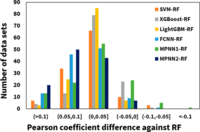
Background
The goal of accessing ADME properties is to understand how a potential drug candidate interacts with the human body, including absorption, distribution, metabolism, and excretion. This knowledge is crucial for evaluating efficacy, safety, and clinical potential, guiding drug development for optimal therapeutic outcomes. Fang et al. 2023 has disclosed DMPK datasets collected over 20 months across six ADME in vitro endpoints, which are human and rat liver microsomal stability, MDR1-MDCK efflux ratio, solubility, and human and rat plasma protein binding. The dataset contains 885 to 3087 measures for the corresponding endpoints. The compounds show the chemical diversity across all ranges of the endpoints which are microsomal stability, plasma protein binding, permeability, and solubility.
Description of readout
- Microsomal stability (human and rat):
LOG HLM_CLint (mL/min/kg), LOG RLM_CLint (mL/min/kg)
- Plasma protein binding (human and rat):
LOG PLASMA PROTEIN BINDING (HUMAN) (% unbound), LOG PLASMA PROTEIN BINDING (RAT) (% unbound)
- Permeability:
LOG MDR1-MDCK ER (B-A/A-B)
- Solubility:
LOG SOLUBILITY PH 6.8 (ug/mL)
- Number of molecules after curation: 3516
Data resource
Reference: Prospective Validation of Machine Learning Algorithms for Absorption, Distribution, Metabolism, and Excretion Prediction: An Industrial Perspective
Github: https://github.com/molecularinformatics/Computational-ADME
Raw data: https://github.com/molecularinformatics/Computational-ADME/blob/main/ADME_public_set_3521.csv
Data curation
To maintain consistency with other benchmarks in the Polaris Hub, a thorough data curation process is carried out to ensure the accuracy of molecular presentations.
The full curation and creation process is documented in 01_polaris_adme-fang-1_data_curation.ipynb.
Disclaimer
Here are some additional details that may be of use when deciding whether or not to use these datasets.
Some advantages include:
- The assays were carried out by one group under a consistent set of conditions.
- The dataset contains only a small number of molecules with unspecified stereocenters.
- There are no duplicate structures in the dataset.
- The data is based on a well-defined ADME endpoint
Some limitations to consider:
- The size of the PPB datasets is small, making it challenging to determine a statistically significant difference between methods on these sets